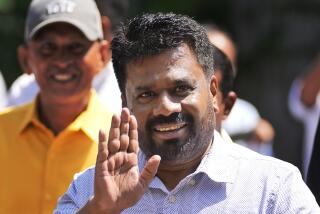India elections see West Bengal’s longtime communist government fall
- Share via
Reporting from New Delhi — India wrapped up its biggest political event of the year Friday as results were announced in four state elections, including an end to the communist government in West Bengal after 34 years in power.
In Tamil Nadu, a party linked to a massive corruption scandal also lost despite a promise to give away millions of food processors, laptop computers and even houses.
The elections, in a nation proud of its status as the world’s largest democracy (a sign reminds you in four languages as you enter from Pakistan), were loud, colorful and expensive.
About 115 million people voted for 6,500 candidates in the states of Tamil Nadu and Kerala in the south, Assam in the northeast, West Bengal and the union territory of Pondicherry, their choices counted by 44,000 people, watched over by 18,000 security personnel.
Two candidates contested from jail while hundreds more ran despite facing charges of committing “serious crimes,” including murder, attempted murder, kidnapping and extortion, free to run until convicted in a nation where court cases can drag on for years. They’re also in good company: 30% of lawmakers in the Lok Sabha, India’s lower house of Parliament, face criminal charges.
Dubious campaign funding and vote buying didn’t abate. About $17 million in “unaccounted cash” was seized, much of it in bricks earmarked for particular wards, a fraction of the total handed out, analysts said.
Ambulances were a popular way to ferry slush money around, media reported, since they’re rarely stopped at checkpoints. Other methods included cash-filled envelopes under banquet plates, direct deposits into bank accounts and paid utility and cellphone bills.
“Very often people with questionable records are considered to have an edge in getting elected over those without muscle,” said Kamalkant Jaswal, director of Common Cause, a New Delhi-based watchdog group. “You also have many political parties with huge donations that never field a candidate in which money laundering is the obvious objective.”
Beyond the billions of dollars spent on campaigns, voter incentives, security and regulating the elections, there was the cost of delayed policy in the states, which have a combined population of 230 million, twice that of Mexico. State governments all but ground to a halt under rules that forbid lawmakers to pass new laws until after the election.
For West Bengal bureaucrats, “the past couple of months have been a dream with tea parties, endless luncheons and leisurely strolls with old friends,” wrote the Telegraph newspaper Wednesday from Kolkata, the state capital.
The biggest upset was in West Bengal, where the mercurial Mamata Banerjee, 56, led her Trinamool Congress party to a decisive victory over the Communist Party of India (Marxist).
“There was so much discontent among people for so many years,” said Sanjeeb Mukherjee, a political science professor at Calcutta University.
This ended the reign of a party that proudly displayed portraits of Karl Marx and Josef Stalin on office walls, held politburos and whose members called one another “comrade.”
Though West Bengal saw 34,000 people detained, 24 killed and hundreds injured in street battles, the election was hailed as a model of restraint. Statewide municipal elections in 2008 and 2009 saw more than 500 political workers killed.
“It has been the most peaceful election ever,” said Shahabuddin Qureshi, India’s chief election commissioner. “I congratulate all concerned for giving a good name to the state.”
Banerjee’s decisive win — her party took three-quarters of the state’s 294 seats — turns her into a powerhouse on the national stage, though it remains to be seen how this will translate. India needs a land acquisition law to build roads and bolster its sagging infrastructure, something she has opposed.
Also unclear was how well the populist gadfly, so successful in the opposition, will perform in government.
Famous for wearing flip-flops, getting into street brawls and publicly humiliating her staff members, Banerjee’s recent two-year tenure as railway minister in the national coalition government left a mixed legacy. She renamed railway stations to score political points, skipped 60% of Cabinet meetings and all but banned the color red at events because it evoked her hated communist adversaries. But she’s also seen by even her fiercest rivals as incorruptible, a rarity.
In Tamil Nadu, the Dravida Munnetra Kazhagam party was trounced after one of its leading lights, former national Telecommunications Minister Andimuthu Raja, was jailed on charges of defrauding taxpayers of up to $38 billion by under-pricing licenses for the cellphone spectrum.
The party’s promise to deliver wholesale freebies if reelected failed to work a second time. After its election in 2006, it gave away 16 million TVs worth $900 million to voters, funded by state coffers.
In southern Kerala, the same Congress party that heads the national coalition government secured a narrow win against left-leaning opponents, with corruption and free rice the major issues. Congress also secured a big win in Assam.
Jaswal, the Common Cause director, said there are groups in India fighting for electoral reform but it’s an uphill struggle.
“I’m not all that optimistic the system will change quickly,” he said. “It’s always a few steps forward, a few steps back.”
Anshul Rana in The Times’ New Delhi bureau contributed to this report.
More to Read
Sign up for Essential California
The most important California stories and recommendations in your inbox every morning.
You may occasionally receive promotional content from the Los Angeles Times.










